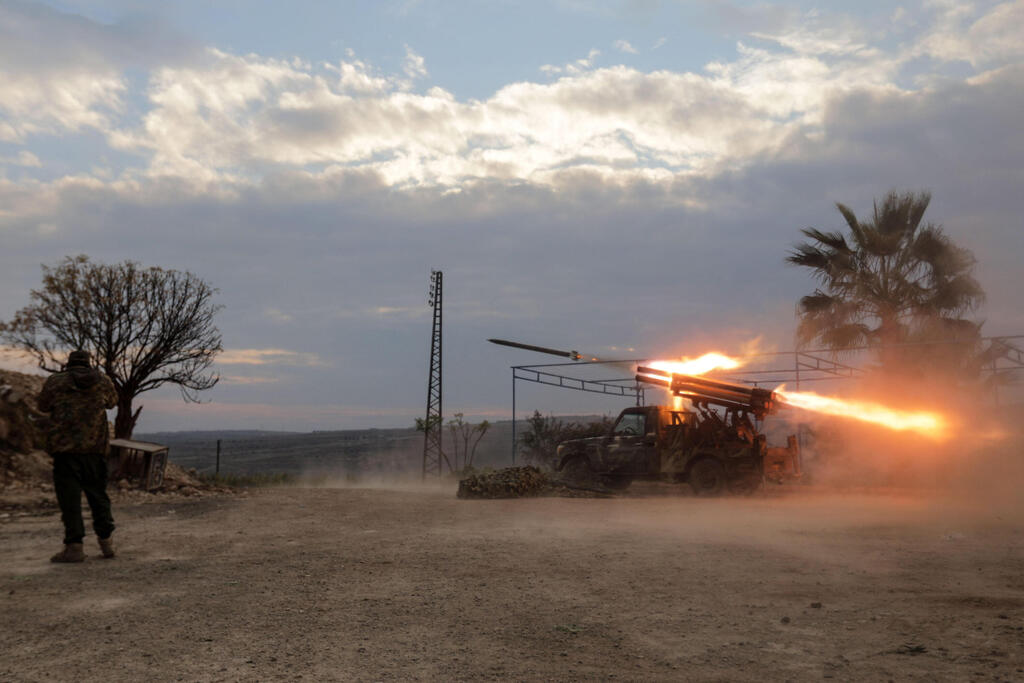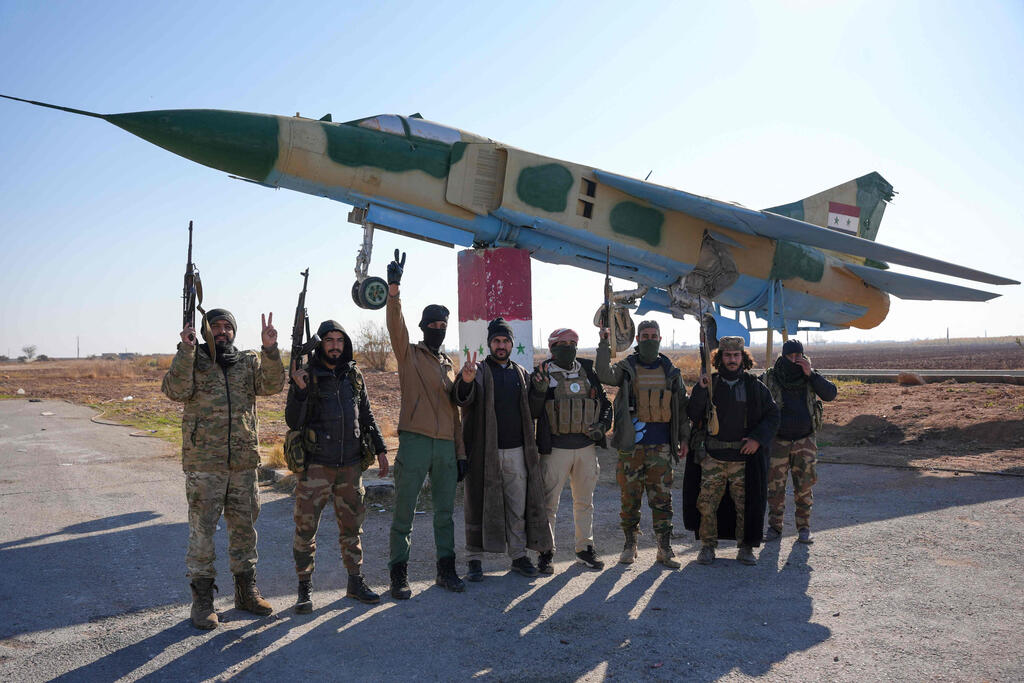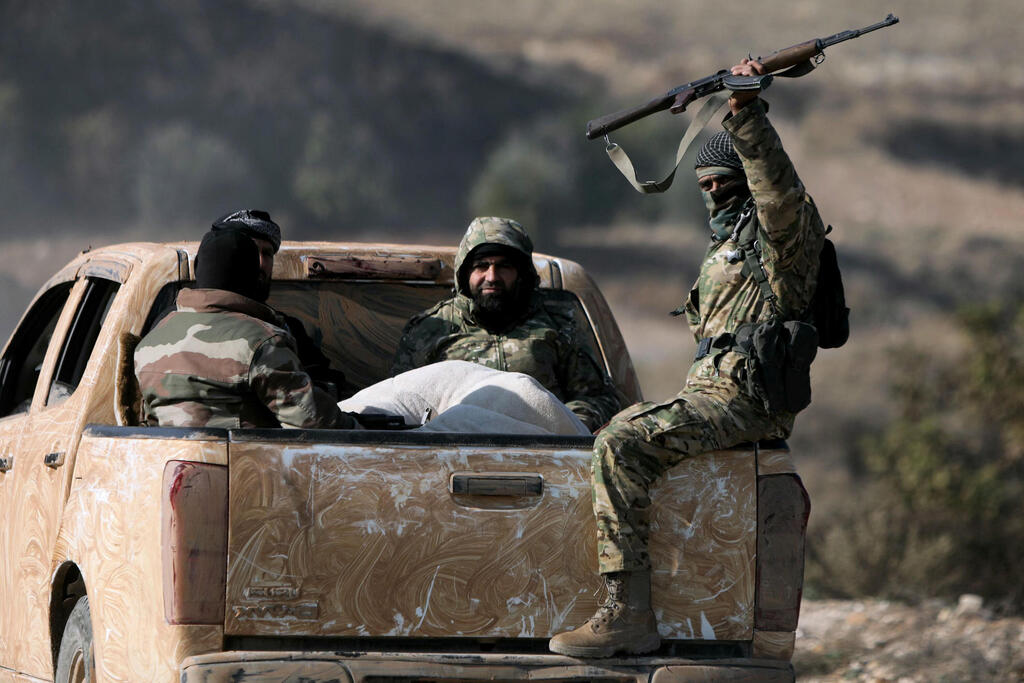Getting your Trinity Audio player ready...
Israeli defense officials vowed Thursday that Iran would not be allowed to arm the Syrian military or reinforce it with troops as Islamist rebels continue to make rapid gains throughout the country.
After launching a surprise offensive last week in Idlib province, the rebels have captured Aleppo and breached defenses in Hama, raising fears that Syrian President Bashar al-Assad may increasingly rely on Iran and its proxies for survival.
5 View gallery


Hayat Tahrir al-Sham (HTS) forces near Hama, Bashar al-Assad
(Photo:Ghaith Alsayed / AP, Reuters)
Officials warned that Israel would act to prevent Iran from reestablishing a foothold in Syria, which could offer Hezbollah a vital military lifeline after suffering heavy losses in its war against Israel. They also noted that they have observed a surge in Iranian efforts to rearm Hezbollah in Lebanon.
Concerns are growing globally over the potential for rebel forces to seize Syria's unconventional weapons stockpiles. According to Saudi outlet Al Hadath, Israel bombed weapons storage facilities north of Damascus overnight, reportedly targeting chemical weapons to prevent them from falling into the wrong hands.
Prime Minister Benjamin Netanyahu recently cautioned Assad against collaborating with Iran and Hezbollah, warning he was "playing with fire." Following the rebel offensive, Netanyahu reiterated that Israel is closely monitoring developments and would act to protect its interests.
The Security Cabinet is meeting on Thursday to discuss the situation in Syria, among other matters, following an early morning security assessment by Defense Minister Israel Katz and IDF Chief of Staff Herzi Halevi.
HTS forces enter Hama
Israeli officials noted Russia's reduced military presence in Syria due to its war in Ukraine, leaving Assad without the same level of support as during the Syrian civil war. Previously, Russia, alongside Iranian fighters and militias, played a pivotal role in stabilizing Assad's regime, enabling him to regain most of the country and confine insurgents to the northwestern Idlib province. In recent years, the fighting had slowed considerably.
The rebel offensive coincided with last week’s Israel-Hezbollah cease-fire, exploiting the weakened Lebanese-based Iranian proxy and pro-Iran militias to advance. Assad's forces retreated, allowing Sunni jihadist fighters led by Hayat Tahrir al-Sham (HTS), a former al-Qaeda affiliate, to seize Aleppo, Syria’s second-largest city.
Get the Ynetnews app on your smartphone: Google Play: https://bit.ly/4eJ37pE | Apple App Store: https://bit.ly/3ZL7iNv
Despite Russian airstrikes, the rebels continued their advances. Damascus has not confirmed the fall of Hama, though Assad's troops have withdrawn, claiming to "redeploy on the outskirts to avoid urban warfare and protect civilians."
The loss of Hama would be a significant blow, potentially isolating the regime's coastal strongholds in Tartus and Latakia. Latakia, home to Assad's Alawite sect and a Russian naval base, is strategically and symbolically critical to the regime's survival.
Hama’s location on the route between Aleppo and Damascus also opens the way for rebel forces to advance on Homs. The rebels announced their intent to move on the city, urging its population to rise against the government. “Your time has come,” they declared on social media.
The Al Arabiya network reported airstrikes, likely by the Syrian air force, targeting a strategic bridge near Homs to slow the rebels’ advance.
Meanwhile, Iraqi Foreign Minister Fuad Hussein will meet his Syrian and Iranian counterparts Friday to discuss the escalating situation in Syria, according to the Iraqi state news agency.








